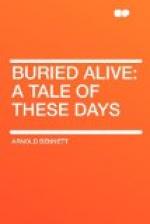“In line, please,” he said.
“I thought it was a restaurant, not a theatre,” Priam whispered to Mrs. Challice.
“So it is a restaurant,” said his companion. “But I hear they’re obliged to do like this because there’s always such a crowd. It’s very ’andsome, isn’t it?”
He agreed that it was. He felt that London had got a long way in front of him and that he would have to hurry a great deal before he could catch it up.
At length another imitation of a policeman opened more doors and, with other sinners, they were released from purgatory into a clattering paradise, which again offered everything save gratuities. They were conducted to a small table full of dirty plates and empty glasses in a corner of the vast and lofty saloon. A man in evening dress whose eye said, “Now mind, no insulting gratuities!” rushed past the table and in one deft amazing gesture swept off the whole of its contents and was gone with them. It was an astounding feat, and when Priam recovered from his amazement he fell into another amazement on discovering that by some magic means the man in evening dress had insinuated a gold-charactered menu into his hands. This menu was exceedingly long—it comprised everything except gratuities—and, evidently knowing from experience that it was not a document to be perused and exhausted in five minutes, the man in evening dress took care not to interrupt the studies of Priam Farll and Alice Challice during a full quarter of an hour. Then he returned like a bolt, put them through an examination in the menu, and fled, and when he was gone they saw that the table was set with a clean cloth and instruments and empty glasses. A band thereupon burst into gay strains, like the band at a music-hall after something very difficult on the horizontal bar. And it played louder and louder; and as it played louder, so the people talked louder. And the crash of cymbals mingled with the crash of plates, and the altercations of knives and forks with the shrill accents of chatterers determined to be heard. And men in evening dress (a costume which seemed to be forbidden to sitters at tables) flitted to and fro with inconceivable rapidity, austere, preoccupied conjurers. And from every marble wall, bevelled mirror, and Doric column, there spoke silently but insistently the haunting legend, ‘No gratuities.’
Thus Priam Farll began his first public meal in modern London. He knew the hotels; he knew the restaurants, of half-a-dozen countries, but he had never been so overwhelmed as he was here. Remembering London as a city of wooden chop-houses, he could scarcely eat for the thoughts that surged through his brain.
“Isn’t it amusing?” said Mrs. Challice benignantly, over a glass of lager. “I’m so glad you brought me here. I’ve always wanted to come.”
And then, a few minutes afterwards, she was saying, against the immense din—




